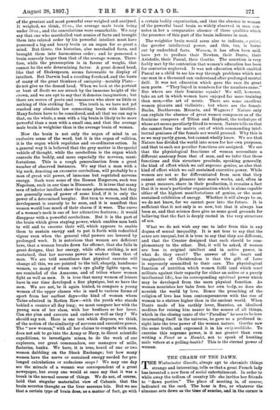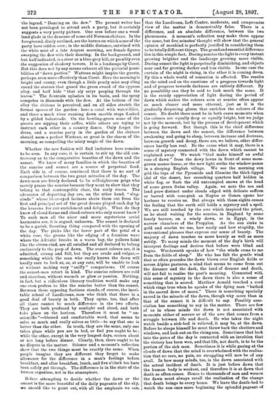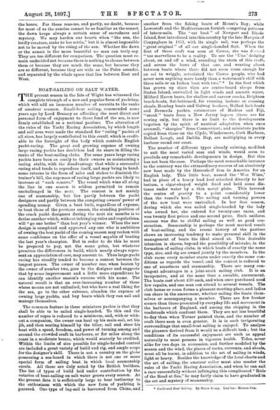THE CHARM OF THE DAWN.
MHE Westminster Gazette, always apt to chronicle things strange and interesting, tells us that a great French lady has invented a new form of social entertainment. In order to while away the tedium of country life she invites her friends to"dawn parties." The place of meeting is, of course, indicated on the card. The hoar is five, or whatever the almanac sets down as the time of sunrise, and in the corner is
the legend, "Dancing on the dew." The present writer has not been privileged to attend such a party, but it certainly suggests a very pretty picture. One sees before one a wood- land glade in the demesne of some old Norman chateau. In the foreground, dimly outlined, are the horses on which some of the
party have ridden over; in the middle distance, entwined with the white mist of a late August morning, are female figures sweeping the dew with their dancing. In the background, and but half indicated, is a river or a blue-grey hill, or possibly even the suggestion of shadowy towers. It is a landscape by Corot. But this does not by any means exhaust all the pictorial possi- bilities of "dawn parties." Watteau might inspire the guests, perhaps, even more effectively than Corot. Here the morning is bright and sunny, even though a little pearly mist may cling round the statues that guard the green sward of the cypress alley, and half hide "that sly satyr peeping through the leaves." The fountain splashes in its basin, and the spray competes in diamonds with the dew. At the bottom of the alley the chitteau is perceived, and on all sides stretch the formal spaces of the garden : here a canal with water-lilies, and there a mock river running down marble steps flanked by a gilded balustrade. On the bowling-green some of the guests are sipping their coffee, while others are trying to instruct each other in a country dance. Only forget the dress, and a sunrise party in the garden of the château should seem a perfect Watteau, so great is the charm of the morning, so compelling the misty magic of the dawn.
Whether the new fashion will find imitators here remains to be seen. In any case, it is certain to stir up the old con- troversy as to the comparative beauties of the dawn and the sunset. We know of many families in which the beauties of the sunrise and sunset are a source of perpetual feud. Each side is. of course, convinced that there is no sort of comparison between the two great miracles of the day. The dawn-men are freely declared to be sclf-righteous prigs who merely praise the sunrise because they want to show that they belong to that contemptible class, the early risers. The advocates of departing day are, on the other hand, " slug- abeds " whose blear-eyed laziness shuts them out from the first and principal act of the great drama played each day by the heavens for our enrichment and delight. What do they know of cloud-forms and cloud-colours who only sunset know To such men all the nicer and more mysterious aerial harmonies are, it is argued, unknown. The sunset is declared to be a garish, flaunting thing compared with the opening of the day. The pinks like the lower part of the petal of a white rose, the greens like the edging of a foamless wave where the Adriatic breaks in a warm bay, the yellows faint like the citron-rind, are all extolled and all declared to belong exclusively to the peep of dawn. The sunset colours are, it is admitted, strong and full, but they are crude and vulgar,— something which the man who really knows the dawn will hardly care to look at, or, at any rate, will be unable to look at without making very " sniffy " comparisons. Of course the sunset-men retort in kind. The sunrise colours are cold and cheerless, without warmth or glow or passion. Nothing, in fact, but a ridiculous literary tradition would make any one even profess to like the sunrise better than the sunset. Between these opposing factions stands, of course, the inevi- table school of Laodiceans, men who think that there is a good deal of beauty in both. They opine, too, that after all there cannot be much difference in the two effects. They are both produced by sunlight and cloud, and both tike place on the horizon. Therefore it must be "un- scientific "—blessed and comfortable word, that seems to solve so much and really solves so little—to say that one is better than the other. In truth, they are the same, only one takes place while you are in bed, or feel you ought to be ; while the other, except in the very longest days, occurs about or not long before dinner. Clearly, then, there ought to be no dispute in the matter. Science and a moment's reflection show that the two things must be exactly the same. When people imagine they are different they forget to make allowance for the difference in a man's feelings before breakfast, and after breakfast, lunch, and five o'clock tea have been safely got through. The difference is in the state of the human organism, not in the atmosphere.
Before attempting to decide whether the dawn or the sunset is the more beautiful of the daily pageants of the sky, we should like to point out, with all the emphasis we can, that the Laodicean, Left Centre, moderate, and compromise view of the matter is demonstrably false. There is a difference, and an absolute difference, between the two phenomena. A moment's reflection may make them appear the same, but five:minutes' thought will show that the general opinion of mankind is perfectly justified in considering them to be totally different things. The grand and essential difference lies in this simple fact. During sunrise the light is every instant growing brighter and the landscape growing more visible. Daring sunset the light is perpetually diminishing, and objects near and far growing darker and less visible. In one case the curtain of the night is rising, in the other it is coming down. By this a whole world of sensation is affected. The results on the mind and on the emotions of a progress towards light and of progress towards darkness are entirely different. By no possibility can they be said to look much the same. It is the steady appreciation of light during the period of dawn which makes the colours seen at sunrise often appear so much clearer and more ethereal, just as it is the gradually deepening gloom that enriches the colours of the sunset. No doubt there must be in both cases moments when the colours are equally deep or equally bright, but we judge not by the moment, but by the process of development which is going forward. But though this is the chief difference between the dawn and the sunset, the difference between awakening and going to sleep, between increase and decrease, between growth and decay, there are, we believe, other differ- ences hardly less real. Be the cause what it may, there is a sense of mystery connected with the dawn which cannot be explained away. We watch "God make himself an awful rose of dawn" from the dewy lawns in front of some moss- grown manor-house, or the new light strike the window-panes in a sleeping English village. We see the morning sun gild the tops of the Pyramids and illumine the thick-lipped idol of the desert, her crouching quarters half hidden in white fog, or flush the old untrampled snows at the head of some green Swiss valley. Again, we note the sea and land grow distinct under clouds edged with delicate saffron or barred with rose-pink as Naples or Genoa opens her harbour to receive us. But always with these sights comes the feeling that the earth still holds a mystery and a spell. We are still touched by the awe which inspired the priest, as he stood waiting for the sunrise, in England by some lonely barrow, on a windy down, or in Egypt, in the narrow chambers of the Propylon. As the sun sinks in gold and scarlet we use, how easily and how stupidly, the conventional phrases that express our sense of beauty. The majesty of dawn touches us more keenly as well as more subtly. To many minds the moment of the day's birth will interpret feelings and desires that before were blind and vague. Wordsworth speaks of how "the winds come to me from the fields of sleep." He who has felt the gentle wind that so often precedes the dawn blown over English fields or across Alpine pastures, a wind that seems to come from out the distance and the dark, the land of dreams and death, will not fail to realise the poet's meaning. Connected with this sense of mystery in the dawn there is also a sense of something that is sacred. Matthew Arnold touched a cord which rings true when he speaks of the dying man "bathed in the sacred dews of morn." There is something specially sacred in the miracle of the dawn, though why more than in that of the sunset it is difficult to say. Possibly asso- ciation has something to say in the matter. There are few of us in whose minds the dawn is not associated with moments either of sorrow or of the awe that comes from a struggle between life and death. He who takes the night watch beside a sick-bed is relieved, it may be, at the dawn. Before he sleeps himself he must throw back the shutters and windows, and look out on the rising sun. Sometimes that look into the gates of the day is connected with an intuition that the victory has been won, and that life, not death, is to be the portion of the sick man. Sometimes it is while gazing at the clouds of dawn that the mind is overwhelmed with the realisa- tion that no care, no pain, no struggling will now be of any avail. In how many minds, too, is the dawn associated with the actual incident of death. It is just before dawn that the human body is weakest, and therefore it is at dawn that death so often comes. Hence to thousands of men and women the dawn must always recall the realisation of the change that death brings to every home. We leave the death-bed to watch the sun once more beginning the splendid pageant of the hours. For these reasons, and partly, no doubt, because for most of us the sunrise cannot be so familiar as the sunset, the dawn keeps always a certain sense of sacredness and mystery. We may harden our hearts when "the sun, the lordly creature, sinks to her settle," but it is almost impossible not to be moved by the rising of the sun. Whether the dawn or the sunset is the more beautiful no man can truly say. They are too different for comparison. The question must re- main undecided not because there is nothing to choose between them or because they are much the same, but because they are so different, because they are wide as the Poles asunder, and separated by the whole space that lies between East and West.




































 Previous page
Previous page